- Home
- Ralph Peters
Valley of the Shadow: A Novel Page 3
Valley of the Shadow: A Novel Read online
Page 3
Pendleton stood by, awaiting instructions.
“Well, sit down, son. You’re not on dress parade. Take me a minute or two to digest all this here strategic wisdom.” He spit again.
Rereading the message left him just as incredulous, if not more. He’d figured that Lee had been just flirting with the notion when the Old Man first raised it. But Lee was serious as a deacon, believing that Early could cross Maryland, march on Washington, and, just for a side bet, send part of his force to the farthest tip of Maryland, where those angels of deliverance would free twenty thousand Confederate prisoners, load a goodly portion into boats that would appear like spooks at a table-rapping, just blithely sailing through the Northern blockade, while the rest of the men newly freed would join Early’s army armed with weapons taken from their guards, instantly organizing themselves into regiments and brigades. And since the guards were thought to be colored troops, there would be little resistance when a mob of Southern gentlemen reared right up before them.
One look at the map revealed the absolute madness of the scheme. Any force that reached the camp would be trapped on that peninsula. Even if the Yankees didn’t seem to have figured out what he was up to yet, they’d surely know by the time he got to Washington. He’d be sending thousands of soldiers into a trap, sending them not to free those prisoners, but to become captives themselves. And not one boat was going to appear off the Maryland shore to rescue anybody. His men wouldn’t have the prospects of a corncob in a shithouse.
It wasn’t that Lee was mad, he understood. The old man was just desperate. He needed those men, any men. Never came up against a bastard like Grant before. Fought like a crazy drunk, too fool to go down. Just came back swinging again, crimson from crown to gizzard. The losses of May and June had been horrendous, on both sides. But the North could replace them, and the South could not.
He had not wanted this damned-fool war. But Jubal Early surely meant to finish it.
“What do you plan to do, sir?”
Early grunted.
“It’s not specifically an order,” Pendleton went on. “It says—”
“I can read, boy. Oh, hell. Send Johnson off, once we’re past Frederick. He’s a Marylander, he knows the lay of the land. See if he can do something. Cavalry’s worthless, anyway. Bundles of rags on broken nags, and that’s putting it sweet. Damned banditti, all of them. Can’t be either trusted or relied upon.” He snorted and took the last swig of lemonade. “Jackson and his damned lemons. I always think about that when confronted with this beverage. Old Jack knew what he was about, give him that. Put his faith in the infantry and artillery, arms you can count on.” Early rose, straightening his back as best his arthritis permitted. Even standing was an effort in the sickening heat.
He took up his hat, pressing a thumb into the side he kept turned up toward the crown. “Draw up orders for Johnson. Give him some latitude, don’t want him humbugging that we forced him to make mistakes he can make just fine on his own. And don’t send them yet, let me read them first.” About to descend from the porch, he turned again. “He still fussing with those Yanks on the Frederick road?”
“He was pushing them back through the pass. According to his last dispatch.”
Early drew out his pocket watch and grimaced. The timepiece rarely gave him cause to smile. “Don’t even report regularly. Scouting’s all this cavalry’s good for, and I can’t count on Johnson or McCausland or any of them to do even that much proper.”
Pendleton didn’t offer a comment. Early knew that his chief of staff thought him too hard on the cavalry. But Early could not help himself. He hated the sight of a soldier on a horse—unless it was an officer leading his regiment or a battery commander keeping the saddle for the elevated view.
Jubal Early understood that he was not considered a fair man. But he differed with common opinion, preferring to view himself as merely honest. He did not exactly revel in making enemies, but found it an inevitable part of war, if a man put winning above parlor politesse. Goddamn South was too goddamned polite for its own goddamned good, that was the thing. Lose the war while stepping aside to let a petticoat pass. No, Jubal Early did not seek popularity, and he distrusted those who courted favor.
Take Gordon, now. Prancing damned prince, that one. Always so damned sure that he was right. Let Breckinridge enjoy the constant stream of wisdom from John Gordon for a while: Gordon always posing for his men, declaiming like a parson set to pass the plate. Early never could understand why the men did not see through it. Instead, they adored the high-flown sonofabitch and hung on his fancied-up talk.
The fact that Gordon had been right too often of late didn’t help matters, either. Just puffed him up the more.
Early strode up the street, heat on his back like a nigger’s bundle, aiming for Ramseur, who knew how to hold his tongue. But his mind was on Gordon now.
Gordon didn’t understand that soldiers had limits. Push ’em, yes. But don’t kill them for your highfalutin vanity. Gordon was just a damned know-it-all who’d had a streak of luck.
He rearranged his chaw with a thick forefinger. Near time to spit it on out.
Ramseur’s last brigade plodded up the incline of the street at Early’s side. The men were too worn down to cheer or jeer, their only noise the tin-cup clank of laden troops and the slap of footsteps. They looked as though they’d been rolled in dirty flour, carrying the dust of a dry month with them.
Ahead, an aide touched Ramseur on the arm, alerting him to his commander’s approach. The young general saluted.
“Dod,” Early said, touching his hat.
“Last of my regiments are closing, sir. Many a straggler, surely, but they’ll be along.”
Early nodded. “And you figure it helps somehow, you standing out in the sun, dumb as a coon?”
“I’m fine, sir. The men need to see their officers.”
“Won’t see much of you, once you’re down with the heatstroke. God almighty, boy, show a lick of sense.”
“I’m fine, sir. Truly.” Ramseur’s eyes lost their steadiness for a moment, as if he were searching his surroundings for reassuring words to speak to Early. He said, “No place on earth I’d rather be than right here.”
“Not with that new bride of yours?” Early hacked out a single-syllable laugh. Women had spoiled many a fine officer. Poor, old Ewell. Even Pendleton had grown inclined to reveries.
“A man … may disassociate certain matters…,” Ramseur tried. “The public and the personal, I mean. They run on different tracks. My place is here.”
“Maryland, maybe. Not in this damned street. One of your factotums can see to these here boys. You take yourself off now. I’ll be calling for you soon enough.” He looked past Ramseur, who was steady of eye again, to the division commander’s bevy of aides and staff men. “Y’all get those soldiers fixed up proper, water ’em up. Like to be marching again in the early hours.”
A chorus of yes-sirs. Early spit his done chaw in the dust.
There were times when he didn’t know how his men did it, marching through such misery. Early didn’t believe he could bear up under it himself, if he had to go afoot. Of course, he’d done his share of traveling hard when he was younger. War was for the young, Lee was right about that. Just needed a few old soldiers around to jerk the brakes on the limbers before the entire battery rolled off the cliff.
He stomped back up the stairs, single spur chinking, and pushed into the house he had taken as his temporary headquarters.
The stale heat and crowding in the parlor drove him back onto the porch. Through the opened door, he barked, “Hotchkiss! Captain Hotchkiss! Moore, you go find Jed.”
Then he sat down in the shade to wait. In the few minutes he had been gone, a new layer of dust had settled over things. Nor had the lemonade glass been filled again. The heat just pinned a man down. Below, a wagon that still bore U.S. markings rattled up the street, driven by a teamster who—rare in this show-your-ribs army—had a belly on him. Only when the
wagon passed could Early see it was filled with collapsed soldiers.
And Gordon wanted to march them harder still, afeared they wouldn’t make it to Washington before the Yankees caught their scent and loosed the hounds. That primping Georgian, in all his shimmering vanity, would get himself to Washington, all right. With three men and a dog, not a goddamned army. And still the fool men loved him.
Early knew that few men and fewer women would love him. He consoled himself that he had accepted the bargain. But Gordon was a man he was born to resent. Not least after Gordon had been right that second dawn in the Wilderness. And after the Georgian made himself the hero of the Mule Shoe at Spotsylvania. Hero, my rump.
Bugger fought, though. Only reason Early saw for keeping Gordon on. He fought. And he could make other men fight.
That pestering wife of his, though. Following the army like a … like a …
He found he could not mouth the word that had risen to his tongue. The image of Fanny Gordon was so palpable that he blushed, as if he had spoken crudely in her presence. He despised and deplored the business of wives in the camps, but Mrs. Gordon commanded a certain respect even from him. A formidable woman, Early considered her. Formidable. How the Frenchies said it. And handsome enough to turn a younger man’s head. At least Gordon had possessed the sense to leave her behind in Winchester this time.
Jed Hotchkiss came out on the porch, the army’s wizard mapmaker and a queer young man, splay-bearded, who never quite joined up and held no formal commission, but had been adjudged a captain by common consent, doing better work than a dozen colonels.
“Well?”
“Maps haven’t changed, General.”
“And?”
“Tell you the same thing I told you yesterday morning: If you want to take this army to Washington, the best way’s through Frederick City and down across the Monocacy. Best room for maneuver to right or left, come what may. Keeps the Federals guessing, too. Until you tip your hand, you could be headed for Washington or Baltimore, either one.” Hotchkiss stood clutching his treasures, awaiting an order to spread them out in the dust. The man guarded his maps the way a sultan guarded his harem.
No. Those maps were worth a damned sight more than a coop of Turkish harlots.
“Well, sit down, Hotchkiss. Tired of telling you. Never been one to stand on ceremony.”
The mapmaker smiled. “You have your moments, General.” He sat down. Dust puffed from the parlor chair that had been set on the porch.
“Do I?” Early asked. “Suppose I do, at that. What do you reckon? How many marches to get this army to Washington? Frederick way?”
“Three hard marches and a rush.”
Early nodded. “Put us in sight of the Capitol July tenth.” He snorted. “Shame we missed the Fourth.” He calculated for a moment. “Cavalry could get there night of the ninth. For what those brigands are worth.”
“If all goes well, sir.”
Early leaned back, smiling. “Wonder how John Breckinridge will feel? Walking the halls of Congress? Not every former vice president returns a conqueror.”
“No, sir. Sure enough not.”
“Madcap world, Captain Hotchkiss, a madcap world. I do have days when I believe I should have stayed home in Rocky Mount with a barrel of good whiskey.” He turned his head toward the house, feeling the stiffness of age. He shouted: “Colonel Pendleton? Any damned body?”
In moments, Sandie Pendleton appeared. He, too, had recently married, despite Early’s remonstrance. His bride was a woman of irksome vivacity, pregnant as a sow.
Early fished in his pocket for another chaw. “Orders for General Breckinridge. Get him started toward Frederick. His division and Gordon’s, his whole wing. After dark, when it’s cool.”
“It’s hardly cool even then, sir. But I take your point.”
“Then get orders out to everybody else. This army converges on Frederick. Sweep away any damned militia, I’ve had enough of Johnson’s pussyfooting. And let me read those orders for his pony-boys.”
“Yes, sir. Anything else?”
Down in the street, a last, lone soldier limped along, more dust than man, rifle athwart his shoulders. He showed no interest in the occupants of the high porch, his only concern putting one foot down, then the other.
“Anything else, sir?” Pendleton repeated.
“See if there’s any more of that lemonade.”
July 7, 3:45 p.m.
Monocacy Junction
Lew Wallace watched as his men worked the ropes to lower the big brass gun into position. The twenty-four-pounder was the only powerful piece of artillery he had, and he’d ordered the construction of a demi-lunette, all done by the book, that would let it range the far fields across the river. Red-faced, with gritted teeth, the artillerymen did the work of a half dozen mules, yet beyond the normal condemnations of various deities, ancestors, and hypothetical females, the men seemed willing enough. He only hoped they would be as willing once the shooting began.
Watching his soldiers strain, Wallace felt a democratic, midwestern urge to strip off his blouse and help them. But generals had to remain aloof, he had learned, so the men would not realize how mortal and slight they were.
He listened for a renewal of the fighting west of Frederick, along the Hagerstown road. But the skirmishing and occasional clashes had calmed around noon and the fields remained still across the heavy hours. It had given him time to push support to Clendenin, whose men had fired up their carbine ammunition, and he had dispatched Ras Tyler to take overall command and to get what service he could out of his Potomac Home Brigade’s Sunday-soldiers. It was a patchwork force, at best, but they might hold, if the Rebs didn’t press too hard. Wallace purposed to keep the Confederates out of Frederick City through the night, then to read the situation again in the morning. Every delay was of inestimable value. But the real fight would be here, on the river line; that wouldn’t change. Tomorrow or the next day would bring the bloodletting.
Below the grunting soldiers on the ropes—barked at by a sergeant with an impressive command of metaphor—the station telegrapher stumped his way up the side of the bluff. The fellow was as important as any colonel now, maintaining Wallace’s lifeline to the world, a single wire. Odd for him to stray out in the heat, though. Corpulent, the telegrapher had not been subsisting on military rations. This had to be something important, Wallace realized.
One hoped it was not more bad news.
“Max,” Wallace said to his aide, “see what that poor devil’s got for us, before he collapses and we’re all in the sink.”
Captain Woodhull hastened down the slope, breaking into a trot, only to slow again where the bluff dropped off. Dry grass remained bowed where the captain passed.
The gun settled into place with a thud. The men sighed and loosed the ropes, although the sergeant’s profanities continued.
Wallace turned back to the lesser spectacle of his aide and the heaving telegrapher. Woodhull was reading the message the man had carried.
Alerting like a bird dog, the aide looked up toward him. The captain began to run back up the slope, but Wallace gestured for him to approach calmly. Good or bad, news had to be handled with care. He didn’t want to spook the men nearby: Rumors spread faster than cholera in an orphanage.
Woodhull continued running.
When he put the message into Wallace’s hands, the general understood why. It was from the railroad’s president, in Baltimore:
A large force of veterans arrived by water, and will be sent immediately. Our arrangements are made to forward them with the greatest possible dispatch.
J. W. Garrett
Across the fields, past Frederick, the cannon opened again.
June 7, 9:00 p.m.
Camden Station, Baltimore
Headquarters of the Baltimore and Ohio Railroad
John W. Garrett sat at his desk, scratching his nose. He did not keep liquors in his office, but would have been tempted to have a drink had a bottle put in an
unexpected appearance. Having whipped off his subordinates to their myriad tasks, he still feared that some crucial matter had been overlooked, some vital word not passed. An immense amount of work had to be done, a daunting amount, but it could be brought off. If he kept his sanity. This night, and for as many nights to come as the purpose required, those trains would be loaded and moved, and he’d teach those military pups a lesson or two about getting things done.
Garrett prided himself on commanding—for that was the word he used to himself these days—the best-run railroad in the entire Union.
Surprising himself, he brought his fist down hard on the top of his desk, creating an earthquake among the pens and adornments. It was as if he had observed a stranger doing the hammering. Master of himself again, he lowered the paw a second time, but gently. Self-control, in all things, marked the man.
Garrett abhorred inefficiency and could not imagine an organization worse run or more contentedly inept than the Federal Government. War had made a great, blind, lumbering beast of a creature clumsy enough before the first shot discharged. On the twenty-ninth of June, he personally had telegraphed the secretary of war, alerting Stanton—whom Garrett had regarded as rather a friend—to the reports from B&O station agents that Confederate forces were marching northward in dangerous numbers. Since then, he had not stopped forwarding the messages that started as a trickle and became a deluge. Yet Washington had done nothing at all for an entire week, dismissing his reports as impossibilities.
It was a damnable absurdity that the president of a railroad was better informed than the president of these United States. What was the purpose of taxation and fees? Merely to bloat the spoils system?
Stanton was normally a sensible man. But even the secretary of war had been confounded by the insistence of his generals that Early and his corps could not have reinforced the Rebels in the Valley and that any Confederate activity was no more than a raid or a diversion.
One hell of a raid, then, and one hot diversion, with Early rampaging through Maryland, tearing up tracks and burning bridges, and having a splendid time of it. Good God, he longed for just one sensible interlocutor in that foul-smelling city on the Potomac.

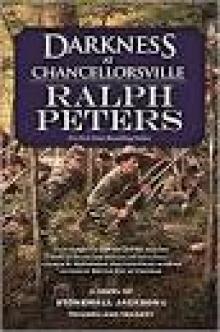 Darkness at Chancellorsville
Darkness at Chancellorsville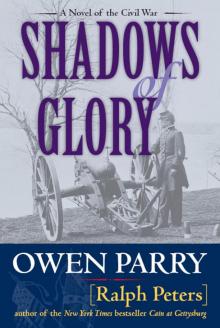 Shadows of Glory
Shadows of Glory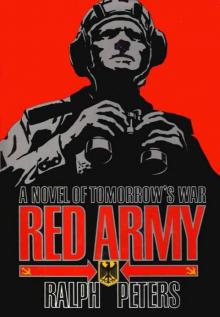 Red Army
Red Army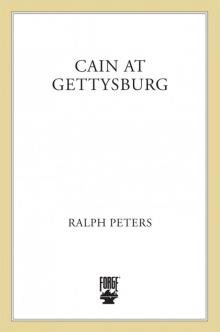 Cain at Gettysburg
Cain at Gettysburg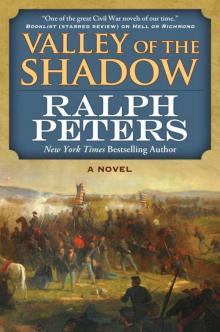 Valley of the Shadow: A Novel
Valley of the Shadow: A Novel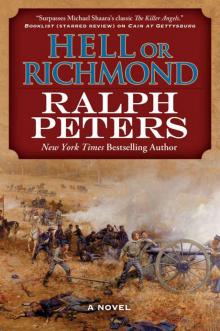 Hell or Richmond
Hell or Richmond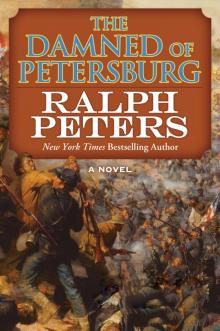 The Damned of Petersburg
The Damned of Petersburg The War After Armageddon
The War After Armageddon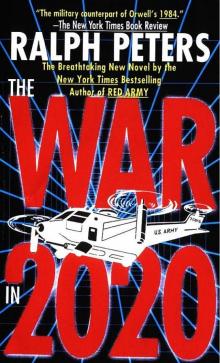 The War in 2020
The War in 2020